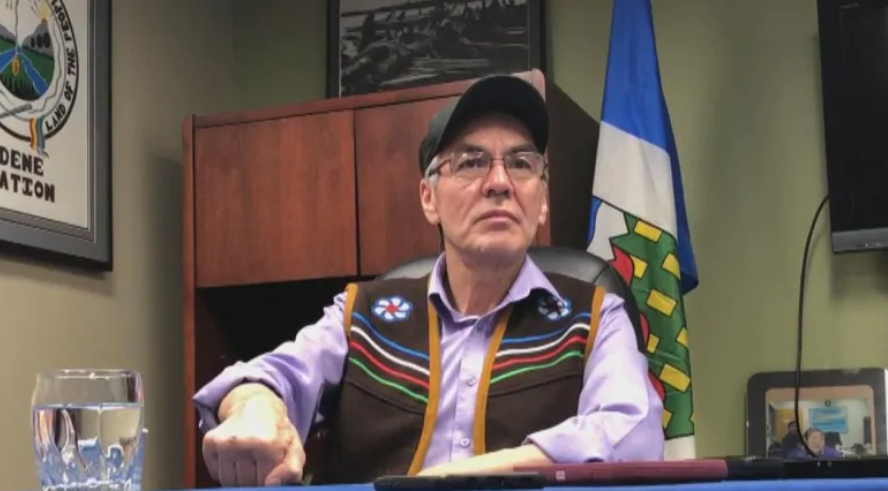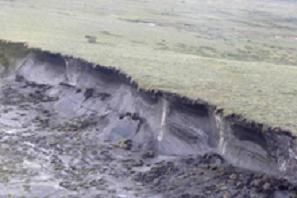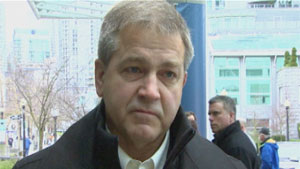Dene Chief in Canada’s Northwest Territories calls on gov’t to act on Alberta’s leaking tailings ponds

New report shows concerns over Alberta tailing ponds leakage date back to 1970s
A recent report that documents the leakage of tailings ponds in Alberta has Dene National Chief Norman Yakeleya calling on provincial and federal governments to establish stricter regulations.
“The Dene are calling on the government, the world of Canada, to stop poisoning us,” Yakeleya said during a Thursday morning press conference.
Yakeleya was referring to the Commission for Environmental Cooperation’s 208-page Alberta Tailings Ponds report, released this fall, which details how tailings ponds across northern Alberta could pose a threat to nearby waterways, including the Athabasca River.
Used in oil sands mining operations, tailing ponds are engineered as dam and dyke systems to store leftover material. The report shows liquid in the ponds has been migrating past designated ditch systems, and that an estimated 785 million litres of tailings fluid did so in Alberta in 2017.
Concerns decades old
The oil sands have tailings ponds in northern Alberta located close to the Athabasca River, which connects to the Slave and Mackenzie Rivers. This is a big problem for the North, Yakeleya said.
“The tailings ponds leaking is a huge concern to the Dene Nation…. It has been 47 years of leakage, and leakage we don’t know the residual results of. And the scary thing is it’s heading down North,” he said.
Citing the report, which says tailings ponds leakage concerns in Alberta date back to 1973, Yakeleya said he is worried about what could happen if leaders don’t take action now.
“We cannot allow the provincial government, Alberta, or even the federal government to play the deception code and not know about this,” Yakeleya said.
“Stricter regulations need to be put in place and soon. So the industry can stop. Stop poisoning our land, our water and our animals.… We need to come together as elected leaders of the North with one clear voice and say that this is not acceptable.”
Federal minister says ‘enough is enough’
Federal Minister of Environment and Climate Change Jonathan Wilkinson said the findings in the report cannot be ignored.
“Enough is enough. Oil sands tailings must be addressed,” Wilkinson said in an emailed statement to CBC.
“We will ensure enforcement officers will be given the tools they need to ensure polluters are held to account when environmental laws are broken.”
Environmental and Climate Change Canada has been directed to review the report’s findings and take necessary action to trace the exact sources of pollution, the minister said, noting $46 million was recently provided to the federal environmental enforcement agency.
“I’m not interested in laying blame. I’m interested in solutions, and we’re here to co-operate with Alberta and Indigenous communities in supporting that effort,” he said.
‘Right now we’re not having that voice’
Revised agreements and input from Dene Nation are some steps Yakeleya would like to see taken.
“We want a review or take a look at the transboundary agreement. We want to look at the environmental commission that was set up in regards to the Fort McMurray oil production. We want a voice at that table,” Yakeleya said.
“Right now we’re not having that voice. People are making decisions for us that are affecting us in the North.”
The N.W.T. government has several transboundary, bilateral water agreements, including with Yukon, Alberta and British Columbia.
Yakeleya said his organization would also like to work with Alberta to see strict regulations put in place.
“We have to put aside our differences and really work on this issue to put pressure on the Alberta government and federal government agencies and take a step forward together to protect our waters in the North,” Yakeleya said
“Above all, we have to protect our people.”
– Story reported and written by Jenna Dulewich, CBC News
Related stories from around the North:
Canada: Gwich’in Tribal Council supports wind project in Arctic Canada despite Nihtat Gwich’in Council opposition, CBC News
Finland: The Arctic Railway – Building a future, or destroying a culture?, Eye on the Arctic
Iceland: Indigenous wildfire knowledge to be key part of new Arctic Council project, Eye on the Arctic
Russia: Russian Indigenous groups call on Elon Musk to boycott company behind Arctic environmental disasters, The Independent Barents Observer
United States: Canadian Gwich’in leaders and conservationists suing U.S. over leasing program for Arctic wildlife refuge, CBC News



